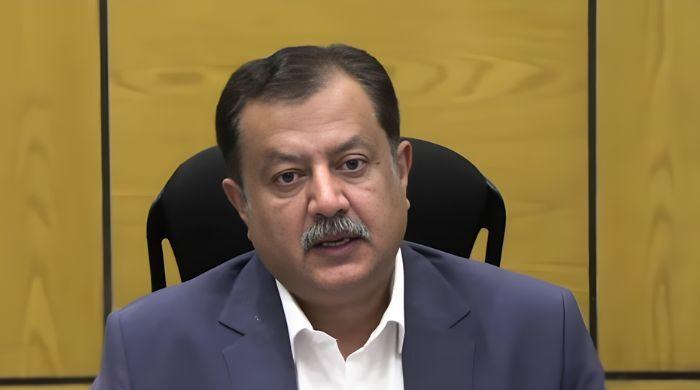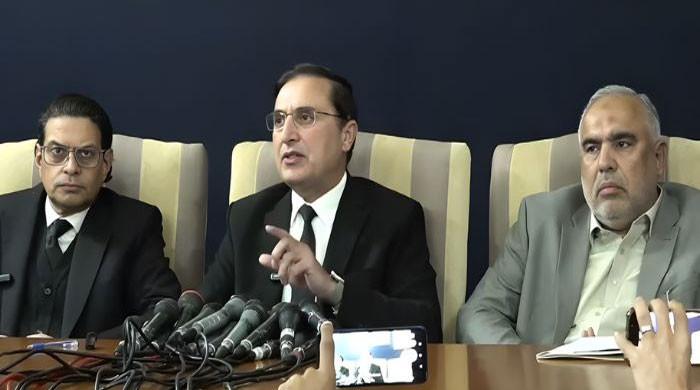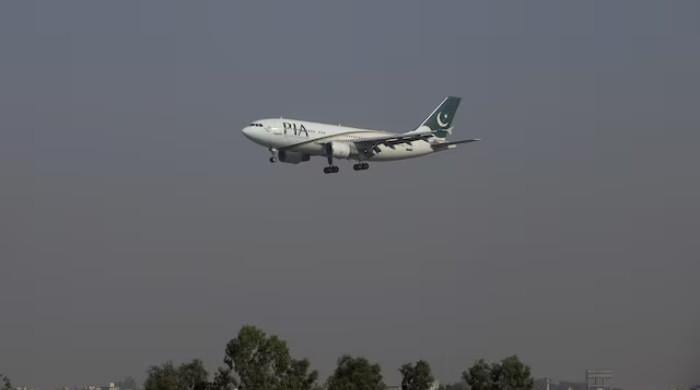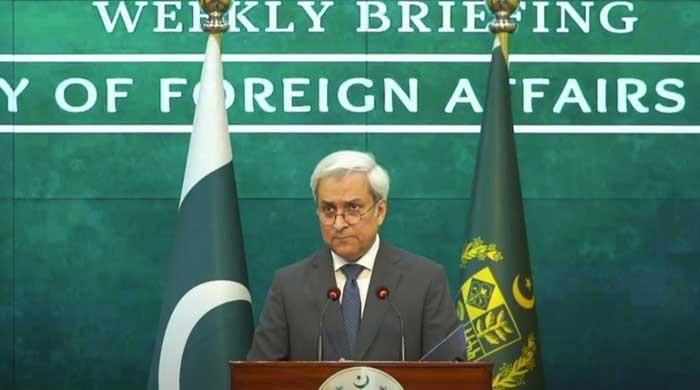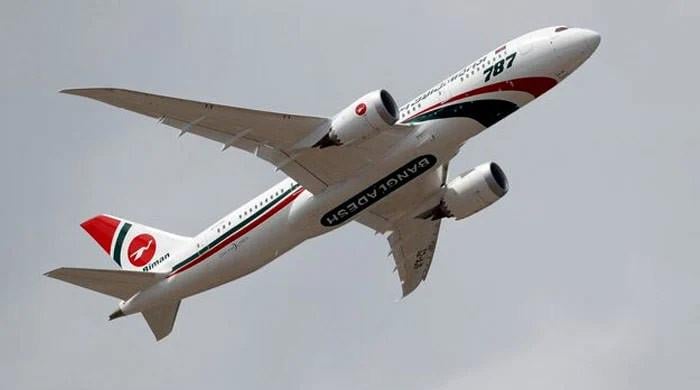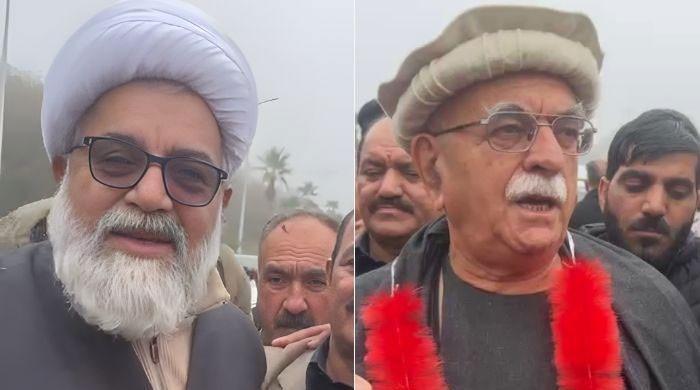Khawaja Saad Rafique talks about arrest, release and future of Pakistani politics
Rafique believes political parties, including his own need, to mend their ways; says was arrested for contesting election against PM
March 26, 2020
PML-N stalwart and former railways minister Khawaja Saad Rafique took aim at democratic political parties — including the PML-N — as he appeared on the latest episode of Geo's 'Capital Talk' to talk about his arrest and subsequent release, the National Accountability Bureau (NAB) and the need for political unity in the wake of the coronavirus crisis.
Capital Talk host Hamid Mir had asked the former federal minister regarding the allegations against him. Rafique responded by saying that NAB had accused him of cheating the public at large and of being the owner of a housing society while using a couple of frontmen to run it instead.
He said that a little over 100 employees were currently working for the housing society whereas, at one point in time, it had 700-800 staffers. "All the rest have been laid off [due to the case]," he said.
"Thousands of people bought plots [in the housing society]. The value of a plot that people bought for a rupee is now worth a few paisas," he added.
Rafique said that the housing society had 7,000-8000 clients out of which 68 were "prepared" as complainants against him and his brother, Salman Rafique.
He said the interesting thing was that throughout the 15 months he was kept in prison, the prosecution did not present even a single affected party in front of him or his brother.
"I just had to be put in jail, Mir sahab. My actions were such that I had to be sent to jail," he quipped.
Rafique says he was arrested for contesting and winning a by-election
According to Rafique, he was arrested and sent to jail because he had decided to contest a by-election from the same constituency where he had been defeated by Prime Minister Imran Khan.
The PML-N MNA alleged that his constituency was divided into three parts intentionally and his strongholds were left out so that he could not contest from them. He said that PM Imran managed to secure a victory through a lead of an estimated 450-500 votes whereas, from other constituencies, he had won with over a margin of 22,000-25,000 votes.
Rafique said that when he requested a vote count, it was also shot down by former chief justice Mian Saqib Nisar. The PML-N leader said that the only option that remained for him was to contest the by-election.
"I had no choice but to contest the by-election," he said. "I think if I did not contest the by-election, I wouldn't have been arrested."
'MSR was arrested because Geo does not bow down'
Talking about the politically motivated case against Jang Geo Media Group's Editor-in-Chief Mir Shakil-ur-Rahman's arrest, the former railways minister said that the veteran journalist was put behind bars because Geo does not bow down before anyone.
Rafique said that those who were languishing in jails due to fake cases by NAB will be granted relief. "The atmosphere has changed. NAB law has been exposed," he said. "The courts are providing relief now."
Referring to his own arrest, the PML-N leader said that NAB did not operate on the basis of any law. "There is no law such as the NAB law. It is the law of the jungle," he said, adding that many people had been jailed as they did not become approvers by switching political affiliations.
Rafique criticises PML-N, other political parties
In response to a question about why the PML-N and PPP governments did not amend the NAB law during their respective tenures, Rafique did not hold back from criticising the two parties.
"It was the PPP and the PML-N's foolishness," he said. "When they [PPP] used to ask us to amend the law, we [PML-N] didn't listen to them. When we did the same, they didn't listen to us."
He said that there were some people in all political parties who thought that they were unrivaled in morals and piety. "When the going gets tough, and action is taken in the name of accountability, these people are nowhere to be found," he said. "Then we are made available."
The former minister appreciated the work done by the PML-N team who had helped create the 18th Amendment but said that "a better team could have been created".
Discussing the ongoing debate of whether or not the government should impose a lockdown in the country, he said that was the only option as there was a dire need to keep people apart. Rafique said that the government should take all political players on board to battle the pandemic.
He called on PM Imran and other leaders to cooperate with each other for the sake of the poor. Rafique said that political leaders should appeal to the affluent and the generous to ensure the needy were provided rations as the government moved towards a lockdown.
"If political leaders and political parties do not take the lead in this, then what are these political leaders for?" he asked.
In response to a question, he agreed that political parties needed to be more democratic in nature. "It is the truth, democracy is present in political parties but to a very limited degree. Political parties have not made institutions and it doesn't seem like they will do that either," he said, calling on parties to organise on the grassroots.
When asked about the 'silence' of the PML-N leadership over the past few months, Rafique said that speaking out had a price that not everyone is always willing to pay.
"I think those who fought on the frontline were correct and those who stayed at the back to shield themselves did not have any other option to do so," he said. "Their ideology was on the right path as well. We should, in political parties, give each other some space on that."
However, Rafique did criticise Pakistan's political parties and said that they were not interested in organising themselves at the grassroots.
"If political parties do not want to organise themselves on the grassroots. If they do not want to create institutions and give authority to their comrades in accordance with what they are owed, then they should not waste people's time. Because people's entire lives are spent in this [politics]," he said.
The PML-N leader said that political parties will have to change the culture of awarding key posts to electables. "These people switch political parties frequently and leaderships provide them tickets and include them in the cabinet as well. This will have to change otherwise the current state of affairs will remain the same," he said.




